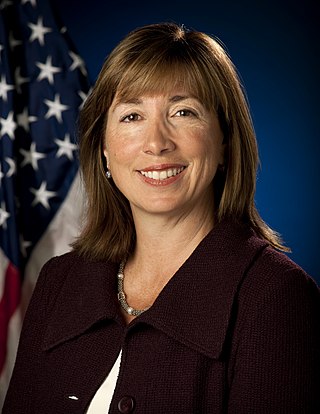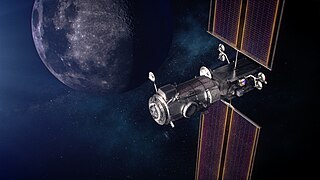
The National Oceanic and Atmospheric Administration is a scientific and regulatory agency within the Washington, D.C.–based United States Department of Commerce, headquartered in Silver Spring, Maryland.

The International Trade Administration (ITA) is an agency in the United States Department of Commerce that promotes United States exports of nonagricultural U.S. goods and services.

The Office of Commercial Space Transportation is the branch of the United States Federal Aviation Administration (FAA) that approves any commercial rocket launch operations — that is, any launches that are not classified as model, amateur, or "by and for the government" — in the case of a U.S. launch operator and/or a launch from the U.S.
New Shepard is a fully reusable sub-orbital launch vehicle developed for space tourism by Blue Origin. The vehicle is named after Alan Shepard, who became the first American to travel into space and the fifth person to walk on the Moon. The vehicle is capable of vertical takeoff and landings. Additionally, it is also capable of carrying humans and customer payloads into a sub-orbital trajectory.

A commercial astronaut is a person who has commanded, piloted, or served as an active crew member of a privately funded spacecraft. This is distinct from an otherwise non-government astronaut, for example Charlie Walker, who flies while representing a non-government corporation but with funding or training or both coming from government sources.
Executive Schedule is the system of salaries given to the highest-ranked appointed officials in the executive branch of the U.S. government. The president of the United States appoints individuals to these positions, most with the advice and consent of the United States Senate. They include members of the president's Cabinet, several top-ranking officials of each executive department, the directors of some of the more prominent departmental and independent agencies, and several members of the Executive Office of the President.

Lori Beth Garver is a former Deputy Administrator of the National Aeronautics and Space Administration (NASA). She was nominated on May 24, 2009, by President Barack Obama, along with Charles Bolden as NASA Administrator. She was confirmed by the United States Senate by unanimous consent on July 15, 2009. She left the position in September 2013 to become General Manager of the Air Line Pilots Association.

Scott Norman Pace currently serves as Director of the Space Policy Institute, Director of the Institute for International Science and Technology Policy and Director of the MA International Science and Technology Policy program at the George Washington University's Elliott School of International Affairs. He served as the Executive Secretary of the National Space Council from July 2017 to January 2021, when he resigned. Pace was formerly the Director of the Space Policy Institute at the Elliott School of International Affairs at George Washington University, where he was also a Professor of the Practice of International Affairs.

The Commercial Spaceflight Federation is a private spaceflight industry group, incorporated as an industry association for the purposes of establishing ever higher levels of safety for the commercial human spaceflight industry, sharing best practices and expertise, and promoting the growth of the industry worldwide. Issues that the Commercial Spaceflight Federation work on include, but are not limited to, airspace issues, FAA regulations and permits, industry safety standards, public outreach, and public advocacy for the commercial space sector.

The Space Launch System (SLS) is an American super heavy-lift expendable launch vehicle used by NASA. As the primary launch vehicle of the Artemis Moon landing program, SLS is designed to launch the crewed Orion spacecraft on a trans-lunar trajectory. The first SLS launch was the uncrewed Artemis 1, which took place on 16 November 2022.

Vulcan Centaur is a two-stage-to-orbit, expendable, heavy-lift launch vehicle created and operated by United Launch Alliance (ULA). It is principally designed for the United States Space Force's National Security Space Launch (NSSL) program, which launches satellites for the Defense Department and U.S. intelligence agencies. It will replace ULA's existing heavy-lift Atlas V and Delta IV Heavy rockets. Vulcan Centaur will also be used for commercial launches, including an order for 38 launches from Kuiper Systems.

Artemis 3 is planned to be the first crewed Moon landing mission of the Artemis program and the first crewed flight of the Starship HLS lander. Artemis 3 is planned to be the second crewed Artemis mission and the first American crewed lunar landing since Apollo 17 in December 1972. In December 2023, the Government Accountability Office reported that the mission is not likely to occur before 2027; as of January 2024, NASA officially expects Artemis 3 to launch no earlier than September 2026 due to issues with the valves in Orion's life support system.

The Lunar Gateway, or simply Gateway, is a space station which Artemis program participants plan to assemble in an orbit near the Moon. The Gateway is intended to serve as a communication hub, science laboratory, and habitation module for astronauts. It is a multinational collaborative project: participants include NASA, the European Space Agency (ESA), the Japan Aerospace Exploration Agency (JAXA), the Canadian Space Agency (CSA) and the Mohammed Bin Rashid Space Centre (MBRSC). The Gateway is planned to be the first space station beyond low Earth orbit.

The space policy of the Donald Trump administration, as of December 2020, comprises six Space Policy Directives and an announced "National Space Strategy", representing a directional shift from the policy priorities and goals of his predecessor, Barack Obama. A National Space Policy was issued on December 9, 2020.

The Artemis program is a Moon exploration program that is led by the United States' NASA and was formally established in 2017 via Space Policy Directive 1. The Artemis program is intended to reestablish a human presence on the Moon for the first time since Apollo 17 in 1972. The program's stated long-term goal is to establish a permanent base on the Moon to facilitate human missions to Mars.

This article documents expected notable spaceflight events during the year 2026.
Swarm Technologies, Inc. is a company building a low Earth orbit satellite constellation for communications with Internet of things (IoT) devices using a store and forward design. Social Capital partners Jay Zaveri and Arjun Sethi incubated and seed funded Swarm, Craft Ventures was an early investor. On 16 July 2021 Swarm entered into an agreement to become a wholly owned subsidiary of SpaceX.















